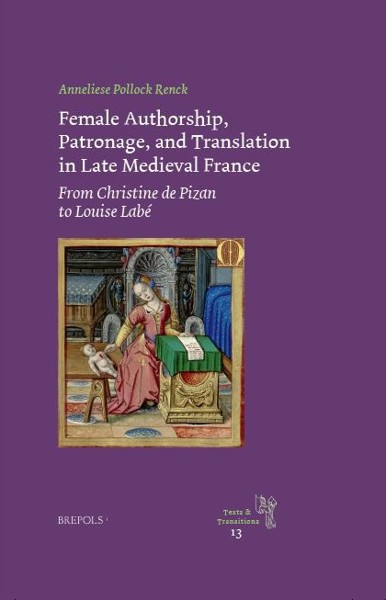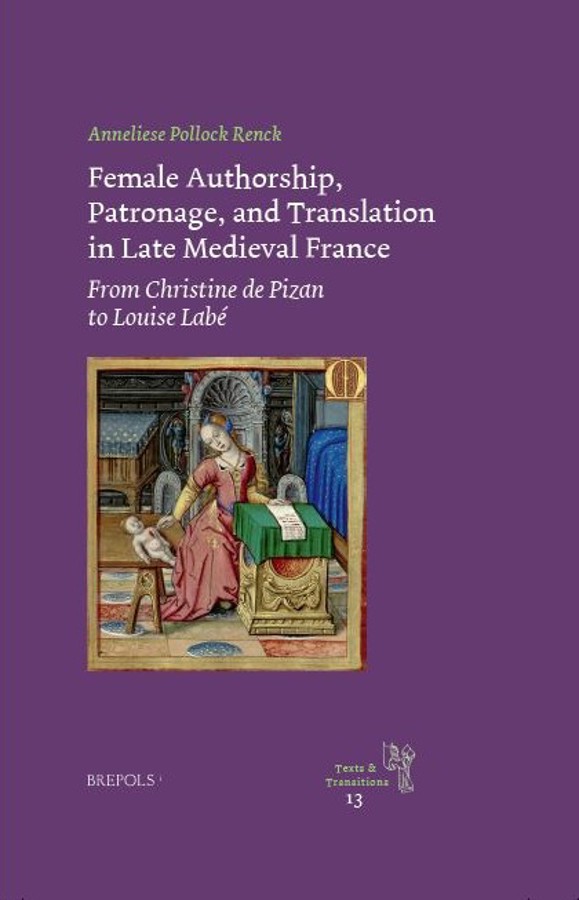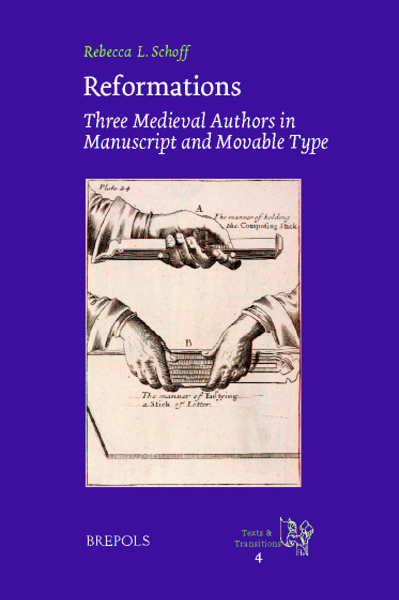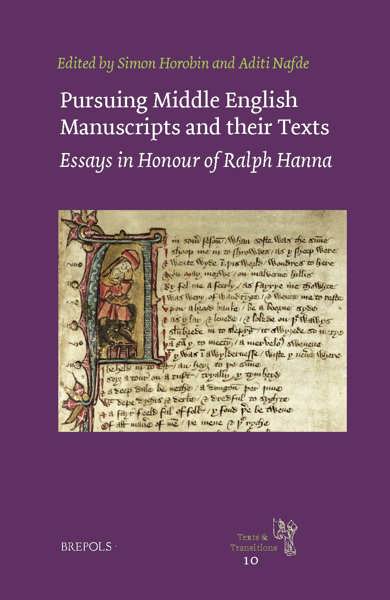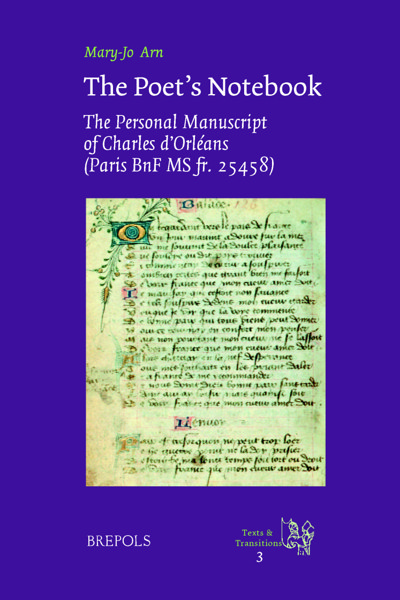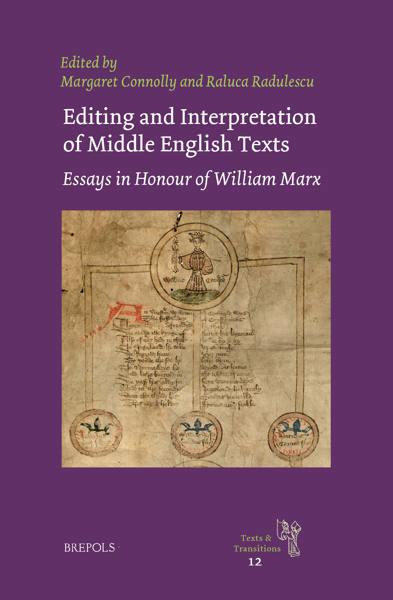
Female Authorship, Patronage, and Translation in Late Medieval France
From Christine de Pizan to Louise Labé
Anneliese Pollock Renck
- Pages: xx + 251 p.
- Size:156 x 234 mm
- Illustrations:15 b/w, 11 col.
- Language(s):English
- Publication Year:2018
- € 95,00 EXCL. VAT RETAIL PRICE
- ISBN: 978-2-503-56921-5
- Hardback
- Temporarily Out of Stock
- € 95,00 EXCL. VAT RETAIL PRICE
- ISBN: 978-2-503-56922-2
- E-book
- Available
This new study sheds important light on the development of female authorship in the sixteenth century, through a close analysis of the female patronage and manuscript production leading up to the Renaissance in late medieval France.
“Renck's holistic attention to the manuscript as a space that includes not only texts, but also paratextual elements (dedications, prologues, marks of ownership) and images is to be appreciated, as is her capacious understanding of female participation in literary culture to include not just writing, but also reading and commissioning works. She provides an effective introduction to well-known, as well as lesser-known, authors and works, and brings to her readers' attention a large number of important and influential manuscripts and their makers.” (Daisy Delogu, in The Medieval Review, 13/04/2019)
« Situé au carrefour des études de genre et des théories sur la traduction, de l’histoire de l’enluminure et des enquêtes sur la littérature de la fin du Moyen Âge, ce beau volume nous présente les résultats des recherches d’A. Pollock Renck sur l’émergence de l’auctorialité féminine entre le XIVe et le XVIe siècle.» (Elisabetta Barale, dans Studi Francesi, 188, 2020, p. 334)
« Le livre est de belle facture, rédigé en anglais dans une langue particulièrement soignée. De nombreux documents iconographiques (couverture, cahier couleur, images en noir et blanc) ajoutent à l’intérêt que doit susciter ce très bel ouvrage. » (Frédérique Le Nan, dans Le Moyen Âge, 1, 2020, p. 143)
« Un coup de maître, par sa liberté et sa rigueur! » (Hélène Cazes, dans Renaissance and Reformation, 43/2, 2020, p. 409)
“Anneliese Pollok Renck’s new book offers a compelling argument for how cultural attitudes toward women’s authorship and reading practices changed between the late medieval and early modern periods and opened space for early-sixteenth-century women writers (…) Overall, Renck’s monograph makes exciting contributions to the fields of translation theory, art history, book history, and the literary study of the querelle des femmes. The book’s greatest strength is its interdisciplinarity and specifically its success in bringing diverse methodologies to bear on the study of women’s literary history.” (Sarah Wilma Watson, in Speculum, 95/3, 2020, p. 885-886)
“(…) the study is a fine contribution to recent scholarship, demonstrating in rich detail the increasing attention on women as literary figures in late medieval France.” (Tracy Adams in Early Medieval Europe, 16/2, 2022, p. 333-334)
"(...) APR propose une étude interdisciplinaire qui, en s'appuyant sur l'analyse textuelle et visuelle de manuscrits et d'imprimés, entend réunir différents champs de recherche actuels, parmi lesquels on peut citer les théories de la réception et de la traduction et les études de genre." (Pauline Dupret, in Le moyen français, 87/2020, p. 194)
Under what conditions did women in late medieval France learn to read and write? What models of female erudition and authorship were available to them in the fourteenth and fifteenth centuries? These questions, often difficult to answer in the extant historical record, are approached here via a number of perspectives, namely, the patronage and book ownership of women between the late medieval and early modern periods, and their involvement in the translation of works from Latin to French.
Through a close analysis of the female patronage and manuscript production leading up to the early modern period, this new study sheds important light on the development of female book ownership, reading practices, and patronage, and, ultimately, female authorship in the fourteenth, fifteenth, and sixteenth centuries. The monograph shows how female book owners in the fifteenth century in particular were provided visual and rhetorical models of female erudition and savoir—models which further encouraged these practices in the generations to follow. In particular, a focus on translations from Latin to French produced for and by women reveals the ways in which female patrons participated in the production of not only books they were able to read in French, but also individual manuscript exemplars that put forward new conceptual frameworks around women’s reading practices. Chapters examine adaptations and translations of Ovid’s Heroides and Boccacio’s De mulieribus claris; the libraries and patronage of Anne de Bretagne and Louise de Savoie; and works by Christine de Pizan, Anne de Graville, Marguerite de Navarre, and Louise Labé.
Colour Plates
Acknowledgements
Introduction
Chapter 1 — Establishing Authority in Medieval Writing and Translation
Chapter 2 — Images of the Woman Reader and Writer in Fifteenth-Century France
Chapter 3 — The Translator as Compiler in Antoine Dufour’s Les Vies des femmes célèbres
Chapter 4 — Adapting the Heroides: Text and Image in the XXI Epistres d’Ovide
Chapter 5 — Literary Afterlives of the Querelle des femmes
Conclusion
Bibliography
Index
